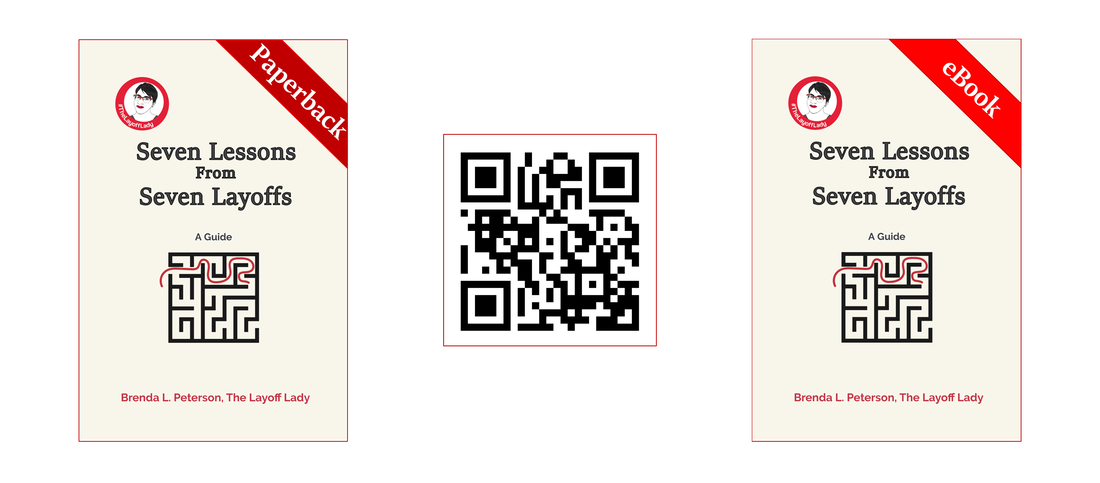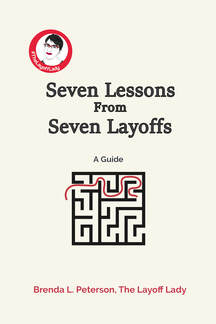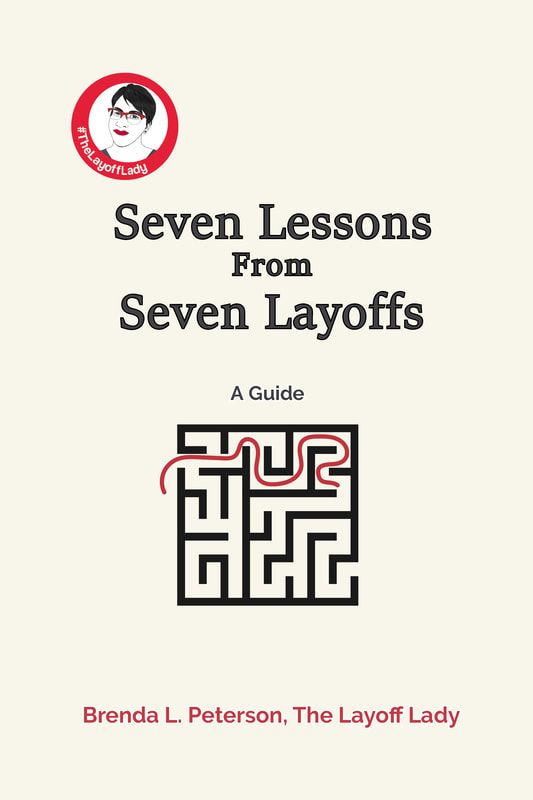|
By Brenda L. Peterson, The Layoff Lady About The Seven Layoff LessonsThrough my seven layoffs and many conversations with others in post-layoff career transition, I have learned seven core lessons:
About Lesson One: Experience Your Emotions and Manage Your Mindset.Right after a layoff, people often act hastily out of sheer unbridled panic. Instead, you must attend to two key tasks right away: feeling your feelings and choosing your career transition mindset. Getting your head on straight before springing into action will prepare you for the challenges ahead. Let’s look at a few key components of this lesson. Experiencing Your Emotions Losing your job, even through no fault of your own, will bring on a myriad of feelings. When someone asks you how you are, you may say “fine,” and you may even think that you are, indeed, fine. In truth, you are pretty far from fine, and you may not be truly fine for a good long while. Right after a layoff, your mind will be spinning as you process what just happened and figure out what on earth to do with yourself next. Your dominant emotions may include shock, anger, sadness, fear, and possibly even relief. As your career transition continues, you’ll cycle through those emotions as you hit ups and downs. At every step of the way, you’ll also experience more people telling you no than at any other time in your life. Through all of these feelings, it’s important that you acknowledge each one, and work your way through them. Managing Your MindsetYour mindset is your overall approach to dealing with the world. It includes how you think about your current situation, including your assumptions about what is true. When people search for a new role, successful people believe that the future will be good while also acknowledging that there will be challenges along the way. Adopting a mindset that combines optimism and realism will help you weather the challenges you’ll face. Changing your language to support your updated mindset will help you stay motivated, no matter how long your search lasts. You Are The CEO of YouAlong with your mindset, it’s helpful to change how you think about work. Instead of thinking of yourself as an employee who has to do whatever their employer asks or else, you need to give yourself a life promotion. In reality, your career is your business, and you are the CEO of You. Just like the executive team at a company needs to make tough decisions for the organization’s greater good, you need to make business decisions that are in the best interests of you and your household. For The Whole StoryFor all the information on each of the seven lessons pick up a copy of my book Seven Lessons From Seven Layoffs: A Guide. Learn More
0 Comments
By Brenda L. Peterson, The Layoff Lady Why I Started The Layoff LadyI remember the good old days when I felt bad for my friend Tricia because she had been laid off four times. When I found myself working through my post-layoff career transition number seven, I decided I needed to do more than just find myself a new professional "day job." I also committed myself to documenting my lessons learned. I wanted to create resources that could benefit others who unexpectedly found themselves unemployed. Out of that decision, The Layoff Lady was born. I share my insights through blog articles, educational sessions, speaking engagements, podcast interviews, and my book Seven Lessons From Seven Layoffs: A Guide. I committed myself to sharing what I had learned to help people on who have been part of a layoff, who are in job transition, and people who want to proactively build their career resilience to help ensure their professional success. About The Seven Layoff LessonsThrough my seven layoffs and many conversations with others in post-layoff career transition, I have learned seven core lessons that can help you navigate this challenging time. If you are in the midst of a post-layoff career transition, these lessons speak directly to the unique challenges you will face as you navigate from layoff day until the first day of your new job. If you're currently employed, but aware that no one is immune to layoffs, these lessons can help you understand the layoff experience and plan ahead just in case it happens to you. Let's briefly review my seven lessons. In future blog articles, I'll expand on each lesson in more detail. Lesson One: Experience your emotions and manage your mindset.Right after a layoff, people often act hastily out of sheer unbridled panic. Instead, you must attend to two key tasks right away: feeling your feelings and choosing your career transition mindset. Getting your head on straight before springing into action will prepare you for the challenges ahead. Lesson Two: Keep your mind on your money (& your money on your mind).Most people work to pay their bills and afford the life they want. Unfortunately, when your job ends, so does your main income stream—and possibly your health insurance, too. Making the right short-term changes can help you weather the storm while also minimizing long-term financial repercussions. Lesson Three: Ask yourself, "What do I want to be next?"Few people take the time to step back from their work life and think, “Is this really what I want to do?” When you go through an unplanned job change, seize this rare opportunity to revisit your career path. Take time for a little structured soul searching and actively decide what you want both long-term and in your next job. Lesson Four: Shape and share your story. Finding a new job is all about you telling the story of your career. You get to shape your professional narrative so you can share your compelling story with colleagues and potential employers. Learning to talk about where you’ve been, your skillset, and where you’re going is powerful. Weaving in company needs with who you are professionally will help you communicate your value more effectively. Lesson Five: Help people help you.It’s hard for many of us to ask for help. If there was ever a time to avoid going it alone, this is it. Overall, people genuinely want to help others through trying times. You can assist them by being mindful of what you need and asking just the right person. Letting people help you will make managing the emotional, logistical, and practical aspects of this career transition easier. Lesson Six: Examine your energy to take control of your time.When it comes to achieving a goal, people often focus on time management. While checking the right items off a task list is valuable, having the energy to do so is often overlooked. Figuring out those right things to do, prioritizing tasks, and factoring in your energy levels will help you sustain your job search momentum for the long haul. Lesson Seven: Assess, adapt, and rise above.Having a plan for success is critical. It is even better to assess how it is going, adapt when needed, and rise above challenges. By anticipating roadblocks and thinking through possible solutions, you can proactively alter your game plan as needed. Learning as you go will help you build resilience and cultivate successful outcomes. For The Whole StoryFor all the information on each of the seven lessons pick up a copy of my book Seven Lessons From Seven Layoffs: A Guide. Learn MoreBy Brenda L. Peterson, The Layoff Lady Learning About YourselfWhen thinking about the life you want to live, it's essential to start with what is truly important to you. Identifying those guiding principles will help you make decisions about how you budget your money, which people you will surround yourself with, and what type of work is right for you. Finding the words to express your values can help you live in alignment and increase your overall wellbeing. The Question: What is Important to Me?In the abstract, it can be hard to figure out what really matters to you. It's even harder trying to convert your thoughts and feelings into meaningful words that can help you express what is meaningful to you. Fortunately, there is a tool you can use to help you find the right words. Part of the Answer: think2perform Values ExerciseAt a previous job, when designing a retirement planning seminar, I discovered the think2perform Online Values Exercise. I take this assessment on at least an annual basis. Even though the words that resonate with me stay very similar over time, the process helps me revisit what matters to me most at that point in time. The assessment includes 51 value cards and four rounds of reviewing the cards. The total time to complete this activity is about 15 minutes or more, depending on how much contemplation you do. In the end, you'll have five value cards remaining with descriptions that name and describe key areas that matter to you. The Words You Choose May Change Over TimeI have completed this values exercise multiple times. My results vary depending on what is happening in the rest of my life right then. The words that have remained in my top five consistently over time are autonomy, relationships, and health. When lilfe has felt unpredictable, words like stability, security, and safety have moved up. Similarly, since work is such an important part of my life, there is always a word directly related to what I do for a living. In the past, terms like work, education, or helping others indicated what work meant to me at that time. Applying Your Values To Your LifeIn the final phase of the values activity, I thought very hard about which words were the best guiding principles for me. Here are the values that resonated with me this time around.
Applying Your Values To Your WorkBe sure to use your values as you consider the type of work you want to do and the workplace environment that will help you succeed.
What Do You Think?How do your values influence your career decisions? Share your thoughts in the comments. Learn MoreBy Brenda L. Peterson, The Layoff Lady Change Is The Only ConstantBusinesses are always changing. They constantly update their strategy to stay viable long-term. Changing staffing levels is one way they evolve to meet those needs. There are a few factors to be aware of that could indicate that changes to your company, and even your role in particular, might be coming. It's also important to note that the presence of one or more of these changes does not mean that all is lost. Use these indicators as one piece of data as you think about the possible future of your job with your current employer. On the positive side, changes may be good--like an opportunity for a promotion or taking on different responsibilities. Alternatively, it could mean that some jobs may be eliminated or changed significantly, which could result in positions being eliminated, layoffs, or even a company-wide reduction in force (RIF). Here are a few signs to look for that may indicate that bigger changes might be coming to your organization. Economic DownturnFrom the dot.com bubble to the 9/11 attacks to the subprime mortgage crisis to pandemic fallout and beyond, economic conditions impact the viability of individual businesses. During the pandemic, we saw some businesses boom (like video conferencing) while others struggled (like hospitality). Consequently, for organizations that were floundering, job eliminations followed. In 2022, mortgage rates rose, causing mortgage companies to streamline their operations. Now, as businesses shift gears post-pandemic, additional workforce changes may be on the horizon. This strategy may help companies realign their staffing levels to meet business needs in a cost-effective way to respond to new economic realities. Financial TroublesNot all companies are successful--even in a strong economy. Companies might miss their sales targets for a quarter (or longer) or start to lose market share to a competitor. It could be a result of a news story breaking that causes consumers to go elsewhere. Whatever the cause of financial troubles, companies need to adapt to survive. To adjust, they may start with small cost-cutting measures, like having fewer snacks in the breakroom or downsizing employee events. On a larger level, there may be hiring freezes, open positions going on indefinite hold, no raises, or skipping performance bonuses. There could even be temporary pay cuts or elimination of some benefits (like employer contributions to a retirement plan). Since salaries are one of the biggest line items companies have, eliminating staff is one way to address financial troubles that show a significant, more immediate impact on the bottom line. New LeadershipWhether a CEO or a frontline manager, leadership changes can impact an employee’s future. When a president is replaced, a VP of a critical department moves on, or a manager leaves due to personal reasons, new people fill those positions. When key staffing changes happen, it is unwise to assume your role and responsibilities are not up for discussion. New leaders typically review the current state, assess staffing levels, revisit company goals, and make changes. This may include them bringing in their own people, restructuring departments, halting unsuccessful projects, or starting new initiatives. In some cases, they may bring in one or more consultants to make recommendations—including the jobs that will continue, their scope, and who will do them. In addition, sometimes if sweeping changes are on the horizon, company leaders start to leave for new opportunities. At one point, I worked for a very large organization with approximately seven layers of management above my individual contributor position. Before I was laid off, six of the seven people working in those positions left. Sometimes leaders leaving is not the cause of the changes, but an indicator that organization-wide changes are taking shape. Ownership ChangeCompanies are always adapting to stay viable. Sometimes, that means a change in company ownership. Possibilities include mergers, being acquired by another organization, acquiring another business, spinning off from a larger company into a separate entity, or changing how the organization is funded (like moving from venture capital to private equity). When ownership changes, so does the organization. In the event of a merger, duplicate teams will combine, and some positions may be consolidated or eliminated. A company culture with very structured documented processes may be replaced by a move-fast-and-break-things startup mindset. New company values or objectives may mean that a department once considered indispensable might now be seen as costly overhead. When a new company takes a closer look at finances, they may be ready to take more immediate action on teams that seem like they are a cash drain. Regardless of the circumstances, one thing is sure. The organizations in question will determine changes that need to be made and move forward to strengthen the company—which may or may not include a job for you. RestructuringOccasionally, companies revisit their goals and decide to switch directions. For example, a call center might start expecting all agents to be able to answer all call types, then shift to having specialized teams, and then decide later to outsource or eliminate a service altogether. The work that may have been completed by two teams may now be the responsibility of one brand-new department. This may also bring in new leaders with new ideas on how to organize work optimally. Shifts take place to minimize costs or capitalize on a potentially lucrative market. Unfortunately, this also means that the job you have that was once considered essential may be deemed out of scope. Reduced ResponsibilitiesOn an individual level, changes to your job (especially if it becomes less challenging) may be a hint about the future of your role. If, at one point, you led projects, and now you are left out of crucial meetings, take notice. See if this is an isolated incident or a pattern. This may also be a downstream effect from changes elsewhere in the organization. For example, a new manager may observe you doing your (now less challenging) job and see a misalignment between the value you bring and the salary you receive. Whether this is due to a new boss who isn’t your biggest fan or one who has a former colleague they want to bring in to replace you, it’s important to pay attention. Changes in responsibilities may put you in jeopardy as the organization evolves. Company CultureDepending on company culture, the amount of voluntary and involuntary turnover varies. While some companies have employees who have been there well over a decade, others may have the bulk of their staff there for less than a year. A larger, more established company has a better chance of longevity, while a tech startup may have more people regularly coming and going. Some companies may quickly decide if an employee is an organizational fit and take action to move them out of the company more quickly. Others will have a structured (and often lengthy) procedure for attempting to correct performance before terminating. An organization’s mission, values, and day-to-day practices will influence your onboarding to a company and when and how quickly you might be offboarded if it's not working out. A Round of LayoffsThe most blatant indicator that you may lose your job is that the company has already done some layoffs. I used to think that if I was still employed after a layoff, my role was safe. Unfortunately, that is not always the case. At one of my jobs, the organization did several rounds of "quiet layoffs." The company never formally acknowledged job eliminations. Instead, I would notice that someone would be listed as "offline" in our office chat application, then later see a LinkedIn post from them saying they were looking for new opportunities. In that role, I had this experience of someone being gone about once a month for a few months. When the company released a new organizational chart, and I was on it, I thought I was safe--especially since at least a couple of people had been eliminated a couple of weeks prior. Shortly after, my position ended as well. All of The AboveSometimes, a layoff is inevitably caused by a series of events. For example, it may start as an economic downturn, followed by the company’s financial issues, then a leadership change, a resulting reorganization, and end with the company being sold. There could be layoffs at any point in this process, and it could also happen more than once. Learn MoreBy Brenda L. Peterson, The Layoff Lady Layoffs Happen All The TimeIt starts like any other day. Then, it takes an ominous turn. Whether you were invited to an ambiguously titled last minute meeting, received an awkward email in your personal email notifying you of your last day, or are perp walked to HR on your first day back from vacation, you are now among the newly unemployed. Welcome to the suck. Now What Do I Do?Even if there were buyout rumors, a quarter with low sales, or a new company direction, being part of a reduction in force (RIF) is still surreal when it happens to you. It's hard to know what to do with yourself when you find yourself unexpectedly out of the job. It's time to redirect your attention. Your New Focus AreasThe work problems you had an hour ago are gone. Along with your freed-up future come very different challenges. It’s time to shift to these top three focus areas:
Your Guiding PrincipleAlong with your new focus areas, your overall guiding principle is not to do anything counterproductive (or downright dumb) as you figure out your post-layoff next steps. Your Never-Do List Here are the career-limiting moves that will make your life harder. Instead of springing into action, stop, think, and then just don't do the following:
Your Think-Before-You-Consider-Doing List Here are a few things you may want to do at some point, but that require thought and a plan before you move forward. At the very least, sleep on it before you do any of the following:
Now that you are at least somewhat inoculated against creating utter chaos for yourself, let's get back to those top three focus areas. Focus Area 1: Process Your EmotionsLosing your job can be an emotional roller coaster. An unplanned job change is a stressful life event on par with getting divorced or going to prison. Just like dealing with a death in the family, you’re dealing with the death of the future you thought you had. Losing that imagined future is a significant loss that needs to be addressed. Figure out how you will cope with these changes. While distracting yourself from the unpleasant parts of the process is natural, building healthier coping mechanisms, like prioritizing self-care, is better for your long-term success. While you can get away with avoiding your feelings for a while, eventually, you need to acknowledge each one so you can move on. If you don’t work through those difficult emotions, your ignored feelings will come out sideways at just the wrong time. It is better to work through your grief privately than to fall apart during an interview or snap at someone who is trying to help you. Step 2: Review Your FinancesDisclaimer: While I know quite a bit based on my previous work experience supporting financial coaches, my own research, and my personal life experiences, I do not currently hold a license or certification to give financial advice. Therefore, the information provided here is educational information provided as guidance. I hope you can glean value from my lessons learned. Feel free to take my recommendations or not—but whatever you do, double-check my information (and everyone's facts, for that matter). This is your life, and you will care more about your finances and health care than anyone else. With that, read on. Possible Money From Your Former EmployerAlthough your paychecks will eventually stop, you will receive your final paycheck, possibly vacation time that you have earned and, hopefully, a lovely parting gift from your former employer in the form of a severance package. Severance could be equivalent to a set number of weeks of pay or include an additional lump sum, continuation of some benefits, and job placement services. In most cases, employers do not have to give you any type of severance. If you are eligible for a severance package, you will need to sign something before receiving that money. Once you sign, any thoughts you might have about legal action regarding your employment with the organization are pretty much over. Read the agreement given to you, consider having a lawyer look it over, and ask for clarifications (and any revisions) before signing it. After that, there is typically a waiting period before you receive that money. I also encourage you not just to sign whatever paper they put in front of you. Make sure you advocate for yourself. Unemployment IncomeAfter a layoff, most people will be eligible for unemployment insurance income, or UI. I encourage you to apply for unemployment payments. The money used to make unemployment payments comes from the payroll taxes that employers pay. That money is intended to help people who have been laid off to pay their bills as they search for something new. Unemployment payments are administered at the state level and vary by state. After you apply, there may be a waiting period before you receive a payment. Your state will also outline the amount of each payment you will receive, the number of payments you are eligible to receive, and additional factors impacting your payments. You may also qualify for job search support services and even programs to help you upgrade your skills. In short, apply for unemployment income right away. In most cases, there is not a good reason for most people to forgo unemployment payments. A Note About Health InsuranceSince many people rely on their employers for health insurance coverage, consider how you’ll cover healthcare costs. If you have a spouse, domestic partner, or parent who can bring you onto their health insurance, that may be your best option. Check with the other person’s employer and let them know you no longer have health insurance through your employer because of a layoff. Their employer can talk you through your next steps and cost changes. If that's not an option, consider COBRA coverage through your former employer. This means you could stay with your previous health insurance, but now you'd pay the whole premium cost. Brace yourself when you see your new premium amount because it is usually A LOT more than you spent as an employee. Another option is going on the insurance exchanges at Healthcare.gov to find coverage. You may even be eligible for a subsidy to offset the cost. Alternatively, for less expensive coverage intended to cover a big expensive medical issue should it happen, short-term health care insurance may be a good interim option. Do your research and determine what makes the most sense for you and your household. Step 3: Prepare For Your Job SearchNext, plan to launch your search for a new job. Start by thinking about what kind of job you want. Write down job titles, possible employers, and your target salary range. Update your resume to include details about your last position and showcase your unique skillset as it aligns with your target job. From here, start letting people know your new status of being “in transition” and ask for help. They might be able to introduce you to a valuable business contact, keep an eye out for job openings that meet your needs, and introduce you to a hiring manager looking for someone just like you. It Will All Work Out. It May Also Take A While.All told, I’ve had seven workdays that started with lots of obligations then quickly evaporated into unemployment. The good news is that it will all work out. The bad news is that there is a lot of uncertainty between your last day of work and your first day of your fancy new job when it does arrive. Using these tips will set you right as you begin your career transition. Seven Lessons From Seven Layoffs: A GuideIf you've recently been laid off, check out my book Seven Lessons From Seven Layoffs: A Guide. You can even buy the eBook to get help right now. In this book, I cover seven lessons from my seven experiences with unplanned job losses. I include my personal stories alongside practical advice for navigating this tumultuous time. You'll learn strategies for managing your mindset, finding the next right job for you, shaping your career story, and overcoming setbacks. Learn Moreby Brenda L. Peterson, The Layoff Lady Insights From An Unemployed Job SeekerAs someone who has been laid off a lot, I have applied for about three bijillion jobs throughout my career. I've become a resume nerd through this whole ordeal. I’m always learning about the best format, writing a punchy introduction, tailoring my resume to each position, and having the right level of detail on my LinkedIn profile. Which leads me to... Insights From A Hiring ManagerOn the other side, I’ve also been a hiring manager searching for new software trainers, learning and development specialists, instructional designers, technical support specialists, and technical writers. As a hiring manager, believe it or not, I very much want you to be the perfect candidate for the position I have open. However, while searching for a new career opportunity is no picnic, being on the other side of hiring is also challenging. Unfortunately, many candidates who apply for a job are either not qualified or represent themselves poorly on a resume. Which brings me to my... Top Five Tips For A Strong Resume
A Secret About Hiring ManagersAs a job candidate, it may often feel like you are at odds with hiring managers, and the companies trying to fill open positions. Want to know the truth? As a hiring manager, I’m really hoping that you are the right candidate for the opening I have. I’m trying like crazy to find just the right person who can do what I need done and who will enjoy working at my company. Each time I come across a resume that includes a great list of skills, but who makes one or more of the mistakes listed above, you're making it harder for me to sell your skills to my boss. Having your resume in a good place makes it easier for me to advocate for you as the right person to fill the available role. Learn More
|

Just get laid off?
Click here for info on what to do first. Author7-time layoff survivor Brenda L. Peterson, The Layoff Lady, waxes poetic on layoffs, job transitions, & career resilience. Buy The Book!Were you recently laid off from your job and need a roadmap for what's next? Pick up a copy of my book, Seven Lessons From Seven Layoffs: A Guide!
Categories
All
Archives
July 2024
|


















